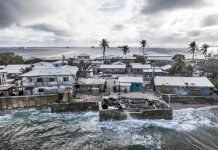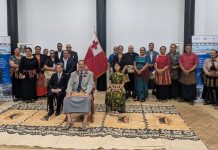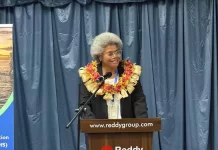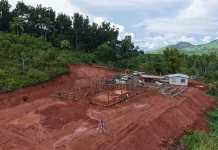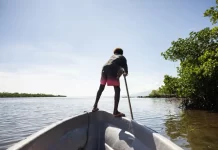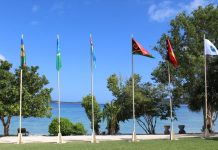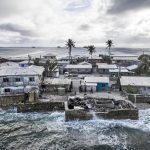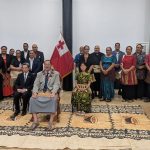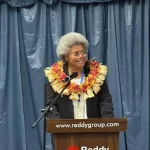The Organisation of African, Caribbean, and Pacific States (OACPS) has delivered a sharp critique of historical polluters during the landmark International Court of Justice (ICJ) climate hearings in The Hague, accusing them of shirking legal accountability for the climate crisis.
Cristelle Pratt, Assistant Secretary-General for Environment and Climate Action at OACPS, said the testimony from the bloc’s members highlighted grave violations of international law.
“After the first week of statements in the landmark climate change case at the International Court of Justice (ICJ), it is no surprise to see the divergence in legal arguments being presented to the Court between the historical polluter developed States and developing States participating in the hearing,” Pratt said.
She called out historical high emitters for “hiding behind the UNFCCC and Paris Agreement” to evade responsibility.
“Presentations from OACPS members representing some of the world’s most climate-vulnerable States across African, Caribbean and Pacific regions painted a picture of climate catastrophe and the violation of international laws. These include those that require States to prevent transboundary harm to other States; fundamental human rights, such as the right of self-determination; the right to a clean healthy environment; and the right to life.
Historical high emitters of greenhouse gases (GHGs), on the other hand, are hiding behind the UNFCCC and Paris Agreement seeking to limit accountability for these violations,” said Pratt.
For many OACPS countries, Pratt noted, this case marks their first time before the ICJ, pushing back against a system that often marginalises their voices.
“Our members across African, Caribbean and Pacific regions are relatively new States, many of which share colonial histories with the major historical polluters. For many of them making statements at these proceedings, it is the first time they are coming to the World Court to advocate for their rights, and some of our members have made very compelling arguments to fight once again for their self-determination,” she stressed.
Pratt highlighted the injustice faced by climate-vulnerable nations.
“For all of our member States, the common experience shared in the climate crisis is one of climate injustice. Collectively they have benefited the least from what has caused the climate crisis — uncurbed cumulative GHG emissions — but are now suffering the most and at the cost of their nations’ and peoples’ sustainable development,” she said.
Reaffirming the principles of equal rights and self-determination enshrined in UN charters, she warned against their erosion in the context of climate change.
“The principle of equal rights and self-determination of peoples is written into the Charter of the United Nations and is reinforced by numerous UN treaties and ICJ rulings and advisory opinions. All of these words risk erasure if they are exceptionally excluded in the context of climate change.”
As the ICJ hearings enter their second week, OACPS members continue to push for legal recognition of climate-related human rights violations and demand accountability from historical polluters.
Vanuatu Attorney General Arnold Loughman Kiel said, “Under international law, States have obligations: obligations to act with due diligence; to prevent significant harm to the environment; to reduce their emissions and provide support to countries like mine; to protect the human rights of present and future generations; to protect and preserve the marine environment; and to respect the fundamental rights of my people to self-determination in our own land. […] In a system intended to uphold peace and security, self-determination, the enjoyment of fundamental rights and the protection of the environment, how can the conduct that has taken humanity to the brink of catastrophe, threatening the survival of entire peoples, be lawful and without consequences?”
Julian Aguon, Legal Counsel, Melanesian Spearhead Group (MSG) said, “Self-determination guarantees the right of all peoples to freely determine their political status and freely pursue their economic, social and cultural development. It also encompasses their rights to maintain their territorial integrity and permanent sovereignty over their natural resources. Yet the conduct responsible for climate change has already infringed on the right to self-determination for the many peoples of Melanesia… Melanesian peoples have already suffered forced dislocations from their traditional territories, loss of natural resources essential for both cultural and physical subsistence, breakdown of political systems and means of self-governance, and rupture of relationships to the cosmos. In short, they have lost nearly everything that has, since time immemorial, formed their very essence as peoples.”
Clement Yow Mulalap, Adviser (Legal) for the Permanent Mission of the Federated States of Micronesia (FSM)to the United Nations in New York said, “International law has numerous systemic gaps, challenges, and blind spots, especially when addressing the concerns of formerly colonized small island developing States like Micronesia who were not recognised as States or whose peoples were not recognised as free when the ramparts of international law were constructed. Nevertheless, we all persist in trying to bend the arc of history toward fairness, equity, truth, and justice, using systems that were not created by us, but which nevertheless promise us relief. It is an exercise in trust and hope. That is why Micronesia is here. That is why the Court is here. That is why this Case is here.!
Teburoro Tito, Ambassador and Permanent Representative of Kiribati to the United Nations said, “We are one of the most vulnerable nations at the front lines of climate change. Our aim today is simple. We want to secure our self-determination and permanent sovereignty over our natural resources. We cherish our traditional way of life. Our relationship to ocean, land and family is our identity. Climate change directly affects the heart of who we are. As an atoll nation, we do not have higher ground. Most of our 32 islands are below 2 m above sea level. Our highest point is only 4 m above the ocean… We do not want to become stateless refugees: we want to stay in our homes, in our communities.”
Luke Daunivalu, Fiji’s Permanent Representative to the United Nations Office in Geneva, said “The economic toll of these (climate) events is staggering, eroding development gains and straining already limited fiscal resources. These climate shocks cascade into broader challenges: food and water insecurity, biodiversity loss, health crises, and more importantly forced displacement… We cannot help but think of our neighbouring Pacific countries, some of which do not have the luxury of relocating within their own borders and face the untenable prospect of completely losing their statehood due to rising sea levels.”
Fuimaono Dylan Asafo, Senior Lecturer, Faculty of Law, University of Auckland, for Cook Islands said, “It is no secret that our international legal system as well as our interconnected economic, financial and political systems are deeply implicated in the climate crisis we face today. For many decades, major emitters have been able to rely on these systems, and the institutions and fora they contain, like the annual COPs, to expand fossil fuel industries, increase their emissions and evade responsibility for the significant harms their emissions have caused. In doing so, they have been able to maintain and grow the broader systems of domination that drive the climate crisis today including imperialism, colonialism, racial capitalism, heteropatriarchy and ableism. Understanding this grim reality of our international systems means understanding that to truly guarantee cessation and non-repetition, States must dismantle these systems and imagine and build new ones capable of allowing everyone to live lives of joy and dignity, so that they are able to determine their own futures and destinies.”
Mamadou Hébié, Associate Professor of International Law, Leiden University, for Burkina Faso said, “Can a limited group of States, in accordance with international law, destroy a common good indispensable to the survival of humanity (the climate system) to enrich themselves, and shift the entire burden of the harmful effects of their actions onto third States, peoples and individuals, while always postponing, if not forever, the question of their responsibility and solidarity? No, no one can enrich themselves unjustly and develop economically at the cost of sacrificing the rights of States, peoples and individuals. These States are bound by all their obligations arising from international law and by all the legal consequences of their internationally wrongful acts.”
Vanica Sobers-Joseph, Legal Advocate and Senior State Attorney, the Commonwealth of Dominica said, “The Court recognised in the Legality of the Threat or Use of Nuclear Weapons Advisory Opinion that there is ‘the general obligation of States to ensure that activities within their jurisdiction and control respect the environment of other States or of areas beyond national control…’ It is no hyperbole that greenhouse gas (GHG) emissions have weaponized the sea into a catastrophic threat. It is the Commonwealth of Dominica’s submission that climate change is a daily threat to the life and the very health of human beings, including generations unborn. The caution urged by some States regarding the Court’s approach to this question is misplaced.”
Phoebe Okowa, Professor of Public International Law, Queen Mary University, and Advocate of the High Court of Kenya said, “Climate change treaties do not constitute lex specialis (the concept that a law governing a specific subject matter overrides a law governing only general matters) but must be interpreted within the broader international legal framework, including human rights obligations… In Nicaragua, you (the court) confirmed that although the content of customary law can be influenced by treaty provisions, both retain a separate legal existence The UNFCCC and Paris Agreement thus exist alongside the customary law obligations of prevention and due diligence, but do not subsume them… States have an obligation to provide reparations, including financial compensation, for harm caused to the climate system. It cannot be right that States responsible for historical pollution can decide in their own self-interest that no legal consequences should attach to a catastrophe of their own making, said Professor Okowa.


